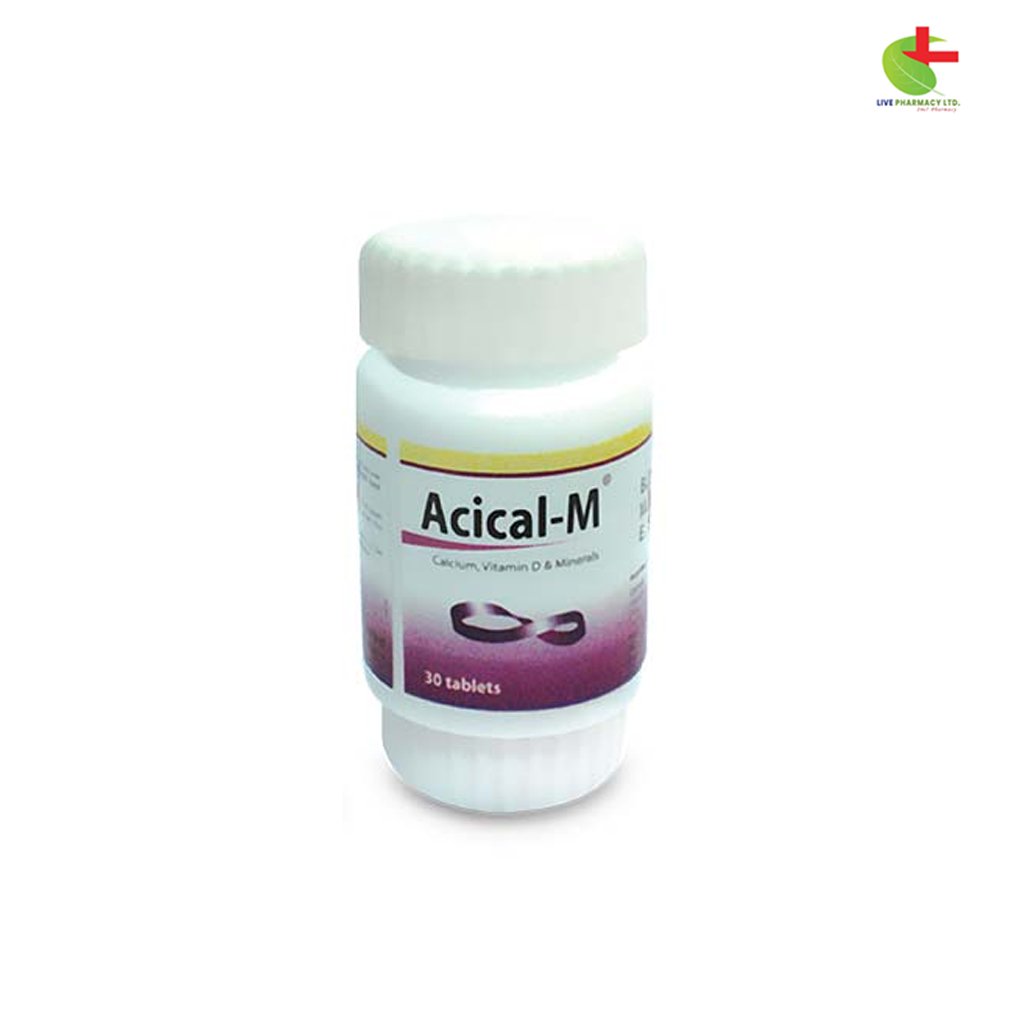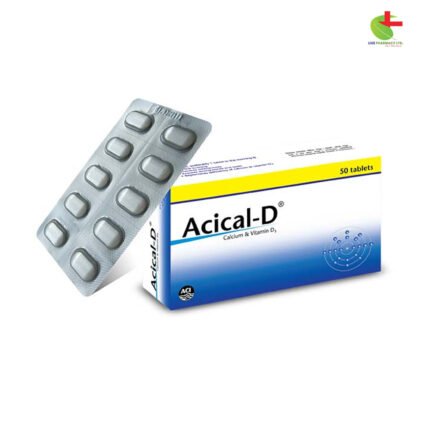Acical-M
80.00৳ Strip(10)
- Acical-MX is a nutritional supplement designed to support bone health and prevent osteoporosis.
- It combines essential minerals and vitamins, including Calcium, Vitamin D3, Magnesium, and Zinc, to promote strong bones.
- Also beneficial for heart, muscle, and nerve function, and suitable for pregnancy and lactation under medical supervision.
- Helps address deficiencies in key nutrients such as Copper, Manganese, and Boron for optimal bone development.
 Brand
Brand
|
ACI Limited |
|---|---|
 Generics
Generics
|
Calcium + Vitamin D3 + Multimineral |
 Type
Type
|
Effervescent Tablet |
Indications
Acical-M is recommended for:
- Prevention and treatment of osteoporosis
- Supporting healthy bone growth and strength
- Promoting optimal heart, muscle, and nerve function
- Acting as a nutritional supplement
- Enhancing bone regeneration and development
- Safe use during pregnancy and lactation under medical supervision
- Addressing deficiencies in Calcium, Vitamin D3, Magnesium, Zinc, Copper, Manganese, and Boron
Consult a registered healthcare professional before use.
Composition
Each film-coated tablet contains:
- Calcium Carbonate BP: Equivalent to 600 mg elemental Calcium
- Vitamin D3 BP (as Cholecalciferol): 200 IU
- Magnesium Oxide BP: Equivalent to 40 mg Magnesium
- Manganese Sulfate Monohydrate BP: Equivalent to 1.8 mg Manganese
- Cupric Oxide: Equivalent to 1 mg Copper
- Boron Citrate: Equivalent to 250 mcg Boron
- Zinc Oxide BP: Equivalent to 7.5 mg Zinc
Each effervescent tablet contains:
- Calcium Carbonate BP: Equivalent to 600 mg elemental Calcium
- Vitamin D3 BP (as Cholecalciferol): 400 IU
- Magnesium Oxide BP: Equivalent to 40 mg Magnesium
- Manganese Sulfate Monohydrate BP: Equivalent to 1.8 mg Manganese
- Cupric Oxide: Equivalent to 1 mg Copper
- Boron Citrate: Equivalent to 250 mcg Boron
- Zinc Oxide BP: Equivalent to 7.5 mg Zinc
Pharmacology
Adequate nutrition is key to preventing osteoporosis and supporting overall bone health. Key nutrients like Calcium, Magnesium, and Vitamin D3 play vital roles in maintaining bone density and strength. Vitamin D3 aids in calcium absorption, while Magnesium strengthens bone structure. Recent studies highlight the importance of micronutrients such as Copper, Manganese, Zinc, and Boron in bone health. Deficiencies in these micronutrients are commonly observed in individuals with osteoporosis.
Dosage & Administration
- Adults: Take 1 film-coated tablet twice daily, preferably one tablet in the morning and one in the evening, or as advised by a physician. For best results, take with or immediately after meals with a full glass of water.
- Children (3-7 years): Take 1 effervescent tablet daily.
- Children (7 years and older): Take 1 to 2 effervescent tablets daily.
Follow your healthcare provider’s advice for proper dosage.
Interactions
Patients taking thiazide diuretics should be cautious as these can reduce calcium excretion, increasing the risk of hypercalcemia. Avoid calcium deficiency in patients on digitalis. Certain foods, such as those containing oxalic acid, phosphate, or phytic acid, may interfere with calcium absorption. Phenytoin and barbiturates may reduce the effectiveness of Vitamin D3. Glucocorticoids and other medications can also affect Vitamin D3’s activity. Calcium may interfere with the absorption of thyroxine, bisphosphonates, fluoride, quinolones, tetracycline antibiotics, and iron; a 4-hour gap between taking these medications is recommended.
Contraindications
Absolute Contraindications:
- Hypercalcemia caused by myeloma, bone metastasis, or other malignant bone conditions
- Sarcoidosis
- Primary hyperparathyroidism
- Vitamin D3 overdose
- Severe renal failure
- Hypersensitivity to any of the ingredients
Relative Contraindications:
- Osteoporosis due to prolonged immobility
- Renal stones
- Severe hypercalciuria
Side Effects
Common side effects may include mild gastrointestinal disturbances such as constipation, flatulence, nausea, gastric pain, or diarrhea. Occasionally, skin rashes may occur following Vitamin D3 supplementation. Hypercalciuria and rare cases of hypercalcemia have been noted with long-term, high-dose use.
Pregnancy & Lactation
During pregnancy and lactation, use only under the guidance of a healthcare provider. Calcium and Vitamin D3 requirements increase during pregnancy and lactation, so supplementation should be balanced with dietary intake. Overdose of Vitamin D3 during pregnancy can have teratogenic effects, and long-term hypercalcemia can lead to developmental issues in newborns. Both Vitamin D3 and its metabolites are excreted in breast milk.
Precautions & Warnings
Patients with mild to moderate renal failure or mild hypercalciuria should be carefully monitored. Regular checks of plasma calcium levels and urinary calcium excretion are advised. In patients with a history of renal stones, measuring urinary calcium is essential to prevent complications. Long-term treatment may require periodic monitoring of serum calcium levels and kidney function. If urinary calcium exceeds 7.5 mmol/24 hours, temporary treatment cessation may be necessary.
Overdose Effects
Overdose symptoms may include nausea, vomiting, severe drowsiness, dry mouth, loss of appetite, metallic taste, stomach cramps, diarrhea, headache, and constipation.
Therapeutic Class
Mineral and Vitamin Combined Preparations
Storage Conditions
Store in a dry place, away from light and heat. Keep out of the reach of children.













Reviews
There are no reviews yet.